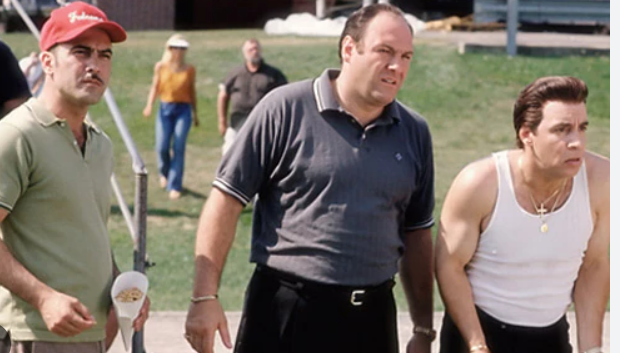
The world of The Sopranos is a gritty tapestry woven with loyalty, power struggles, and, most shockingly, betrayal. As the series unfolds, viewers are drawn into the intricate dynamics of the Soprano family, where trust is as fleeting as a whisper. While many fans can recite iconic quotes and remember key plot points, the underlying betrayals often remain hidden beneath the surface. In this article, we’ll dive deep into the shocking betrayals that defined the characters and reshaped the storyline. Get ready to explore the dark side of loyalty in a world where everyone has a price.
The Foundation of Betrayal in The Sopranos
Understanding Betrayal
Betrayal is a central theme in The Sopranos, manifesting in various forms—from personal disloyalties among family members to the treachery of trusted associates. The beauty of this series lies in its ability to explore the moral complexities of its characters, forcing viewers to confront the gray areas of loyalty and trust.
The Psychology Behind Betrayal
Why do characters betray one another? Often, it stems from fear, greed, or the desire for power. In the cutthroat world of organized crime, loyalty can be a double-edged sword. Characters constantly grapple with their motivations and the consequences of their actions, creating a rich psychological landscape that adds depth to the narrative.
Key Betrayals That Shook The Sopranos
1. Tony and Junior: A Family Divided
H2: The Power Struggle
From the very beginning, the relationship between Tony Soprano and his uncle Junior is fraught with tension. Despite being family, their ambitions clash, leading to a power struggle that culminates in Junior’s betrayal of Tony. The assassination attempt on Tony is a defining moment that highlights the fragility of family ties.
H3: The Consequences of Betrayal
Junior’s actions not only endanger Tony’s life but also alter the entire landscape of their crime family. This betrayal sets off a chain reaction of distrust and hostility, demonstrating how personal grievances can escalate into dangerous confrontations.
2. Dr. Melfi: The Therapist Turned Liability
H2: The Ethics of Therapy
Dr. Jennifer Melfi, Tony’s therapist, becomes a significant figure in his life. However, her professional obligation clashes with the realities of her work with a mobster. When she contemplates exposing Tony’s criminal activities, it reveals her own struggle with the ethics of therapy.
H3: Melfi’s Betrayal
Her decision to withhold vital information about Tony from the authorities can be seen as a betrayal of her own principles. This moral dilemma raises questions about loyalty and the responsibilities of a therapist, adding another layer of complexity to the series.
3. Christopher Moltisanti: The Betrayer Within
H2: Ambition and Jealousy
Christopher’s ambition often leads him down a treacherous path. His growing jealousy of Tony’s success becomes a catalyst for betrayal. His actions against Tony, particularly when he seeks to establish his own identity in the crime world, highlight the dark side of loyalty.
H3: The Ultimate Betrayal
In one of the series’ most shocking moments, Christopher’s betrayal culminates in his death. Tony’s decision to kill him, despite their history, underscores the brutal reality of their world, where loyalty can swiftly turn into a lethal game of survival.
4. Carmela Soprano: The Silent Betrayal
H2: The Price of Comfort
Carmela’s internal conflict reflects the struggles of many women in similar circumstances. While she enjoys the comforts that Tony’s lifestyle provides, her growing dissatisfaction with his infidelities leads her to betray him in her own way.
H3: Emotional Betrayal
Carmela’s emotional distance from Tony and her flirtations with other men signify a betrayal of their marital vows. This duality of love and resentment adds depth to her character and showcases the complexities of their relationship.
5. The Betrayal of Trust: The FBI’s Infiltration
H2: The Long Arm of the Law
As the series progresses, the FBI’s infiltration of the Soprano organization becomes a central plot point. Betrayal from within the ranks, as some members turn informants, creates a palpable tension that puts everyone at risk.
H3: The Impact of Betrayal
The informants’ actions demonstrate how betrayal can stem from a desire for self-preservation. The emotional fallout from these betrayals reverberates throughout the entire team, leading to paranoia and mistrust that disrupts their operations.
The Ripple Effect of Betrayal
The Emotional Toll on Characters
Betrayal has profound effects on the characters involved. The emotional fallout can lead to isolation, anxiety, and even violence. The Sopranos expertly illustrates how these betrayals don’t just impact the individuals directly involved; they ripple through the entire organization, creating an atmosphere of fear and suspicion.
The Moral Ambiguity of Betrayal
One of the most compelling aspects of The Sopranos is its exploration of moral ambiguity. Characters often betray each other for reasons that can be justified, at least in their minds. This complexity forces viewers to grapple with their understanding of loyalty and betrayal, blurring the lines between right and wrong.